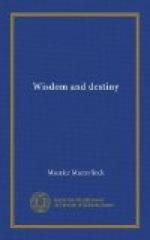49. Were I to refer to the destiny of OEdipus, Joan of Arc, Agamemnon, you would give not a thought to their lives, but only behold the last moments of all, the pathway of death. You would stoutly maintain that their destiny was of the saddest, for that their end was sad. You forget, however, that death can never be happy; but nevertheless it is thus we are given to judging of life. It is as though death swallowed all; and should accident suddenly end thirty years Lot unclouded joy, the thirty years would be hidden away from our eyes by the gloom of one sorrowful hour.
50. It is wrong to think of destiny only in connection with death and disaster. When shall we cease to believe that death, and not life, is important; that misfortune is greater than happiness? Why, when we try to sum up a man’s destiny, keep our eyes fixed only on the tears that he shed, and never on the smiles of his joy? Where have we learned that death fixes the value of life, and not life that of death? We deplore the destiny of Socrates, Duncart, Antigone, and many others whose lives were noble; we deplore; their destiny because their end was sudden and cruel; and we are fain to admit that misfortune prevails over wisdom and virtue alike. But, first of all, you yourself are neither just nor wise if you seek in wisdom and justice aught else but wisdom and justice alone. And further, what right have we thus to sum up an entire existence in the one hour of death? Why conclude, from the fact that Socrates and Antigone met with unhappy ends, that it was their wisdom or virtue brought unhappiness to them? Does death occupy more space in life than birth? Yet do you not take the sage’s birth into account as you ponder over his destiny. Happiness or unhappiness arises from all that we do from the day of our birth to the day of our death; and it is not in death, but indeed in the days and the years that precede it, that we can discover a man’s true happiness or sorrow—in a word, his destiny. We seem to imagine that the sage, whose terrible death is written in history, spent all his life in sad anticipation of the end his wisdom prepared; whereas in reality, the thought




